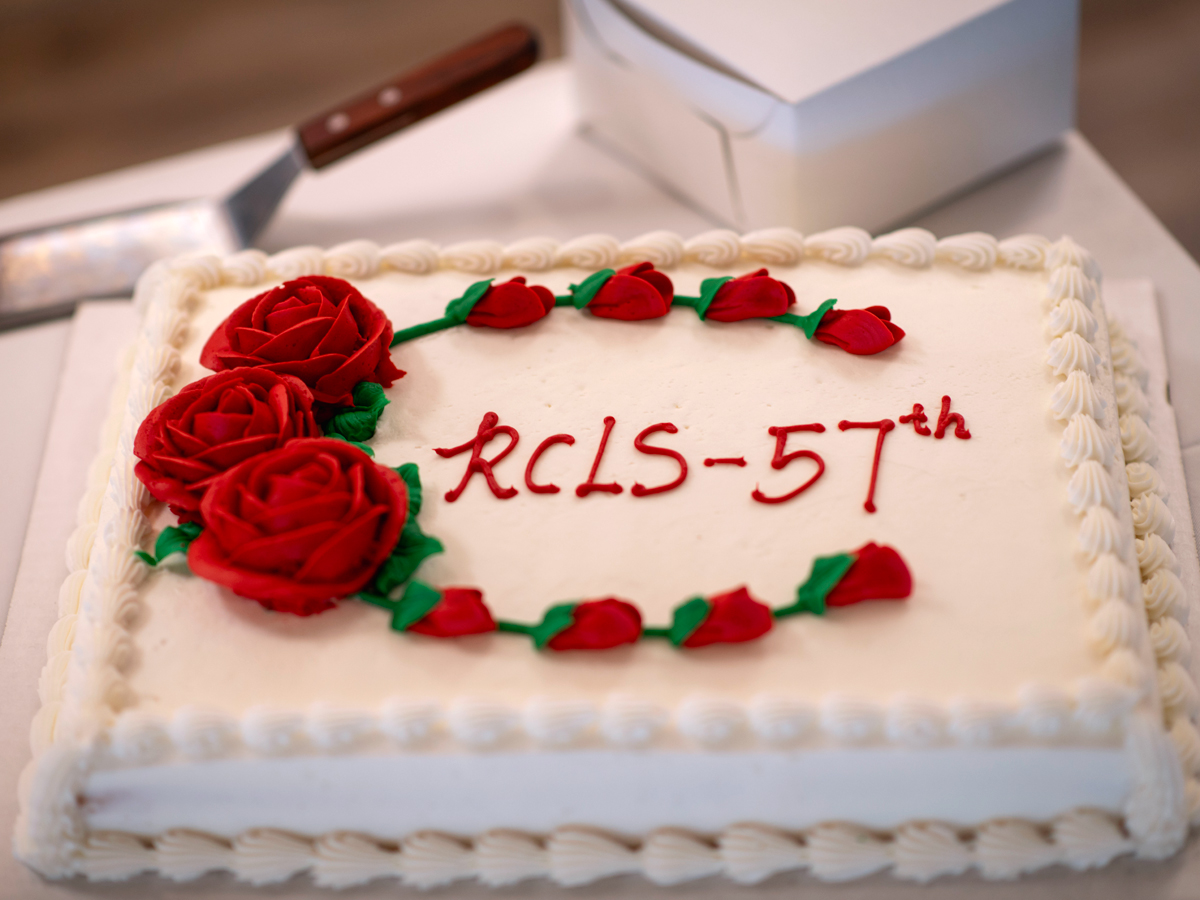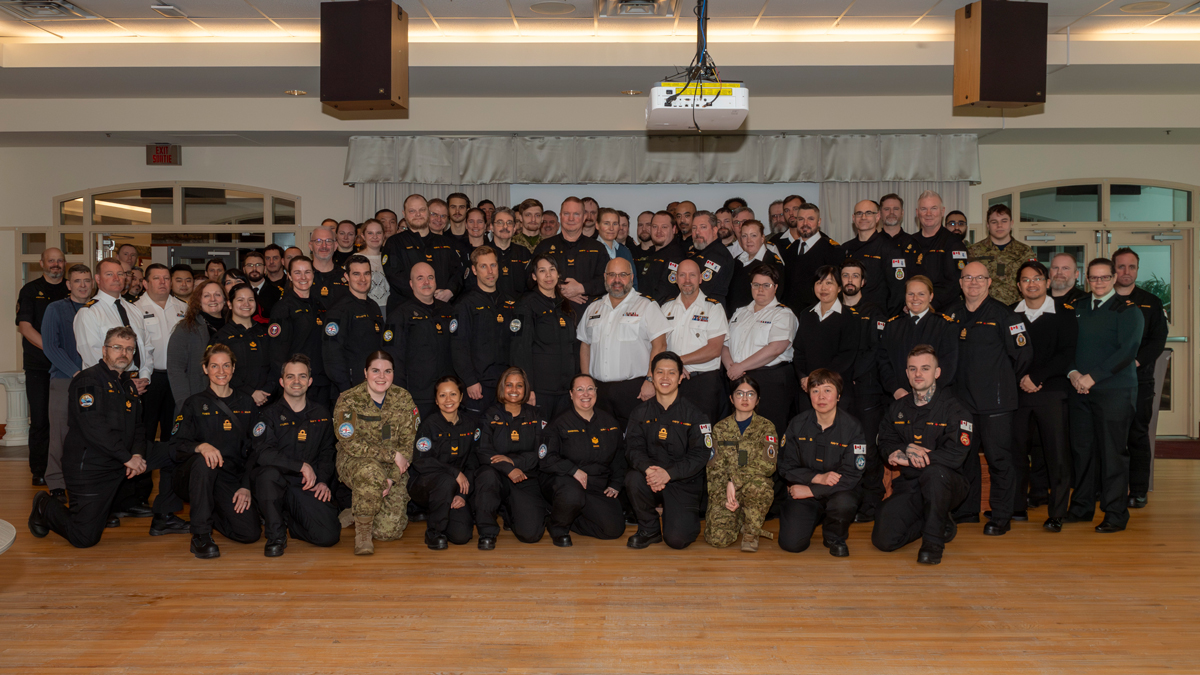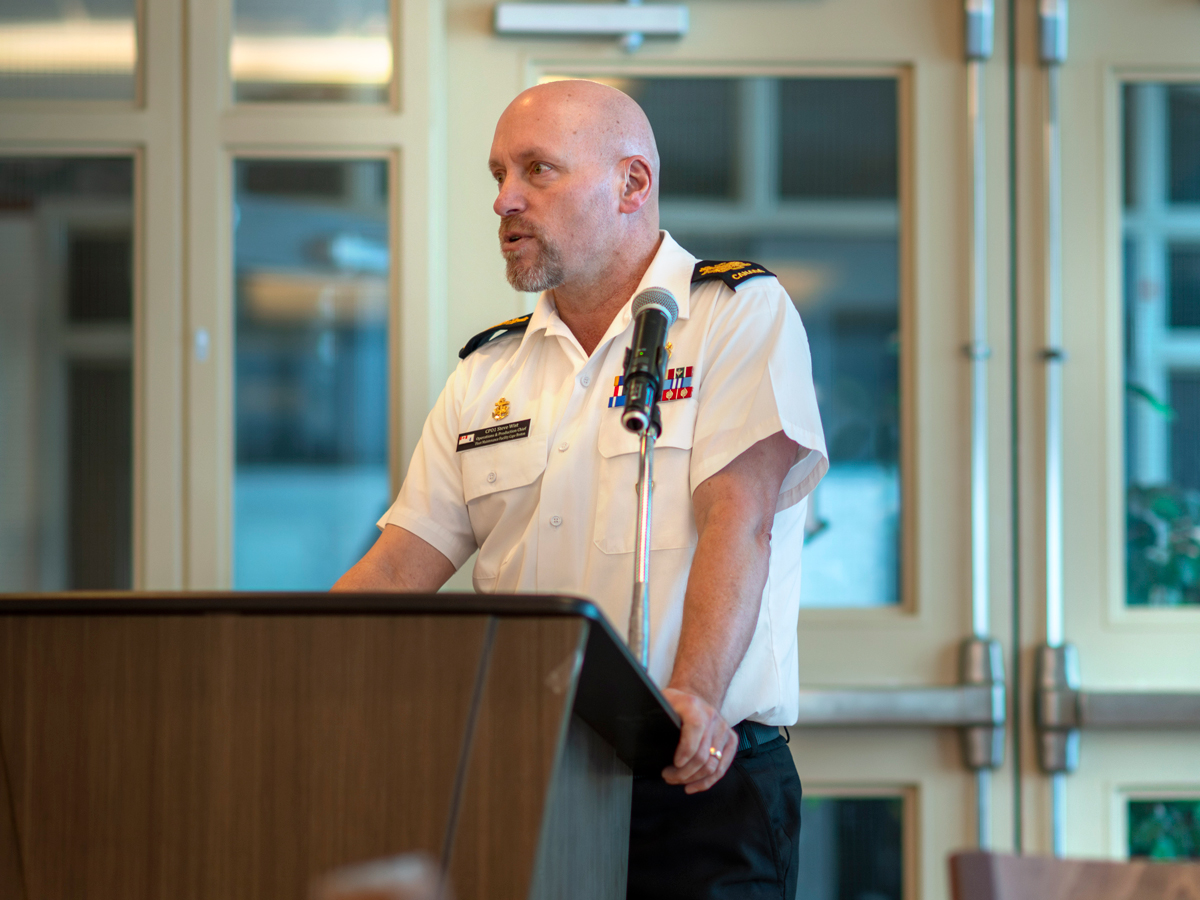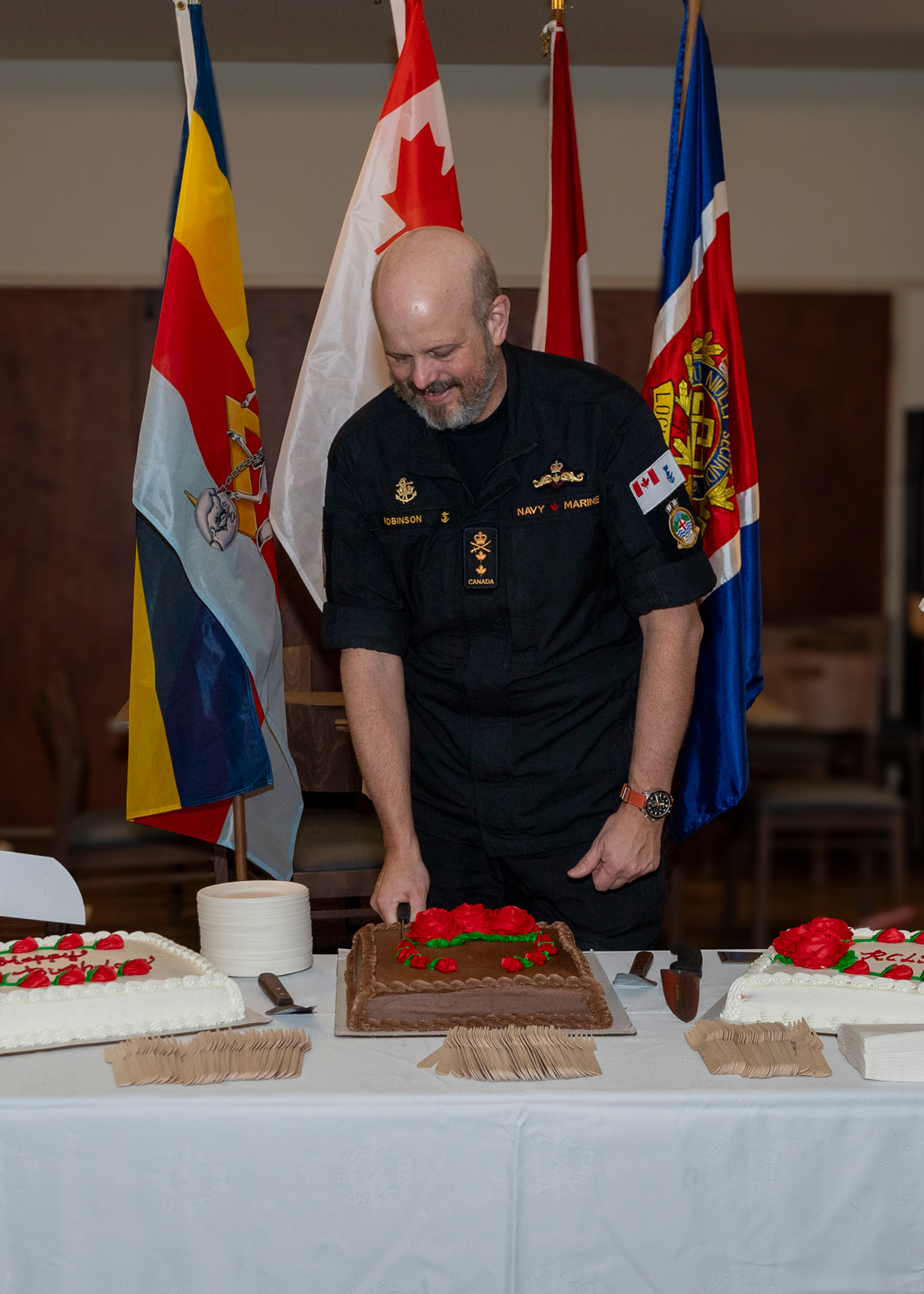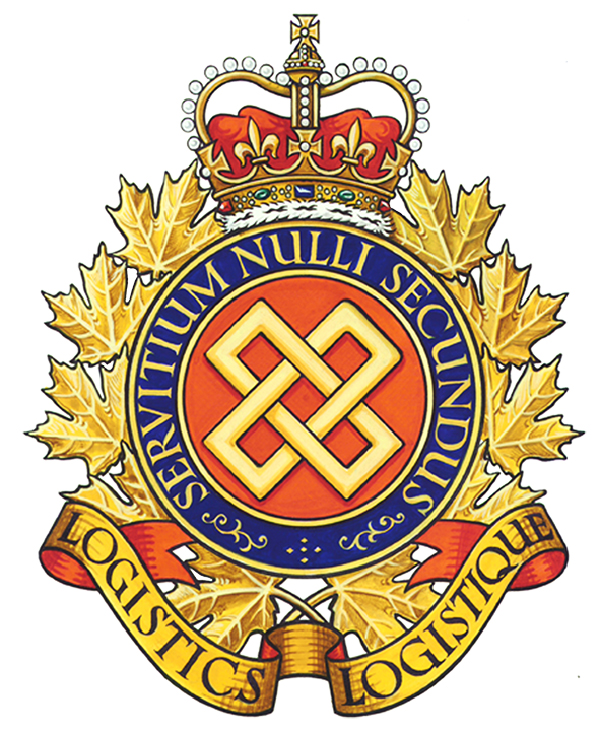Celebrating 57 Years of Excellence: Royal Canadian Logistics Service Anniversary
By Lookout on Feb 14, 2025 with Comments 0
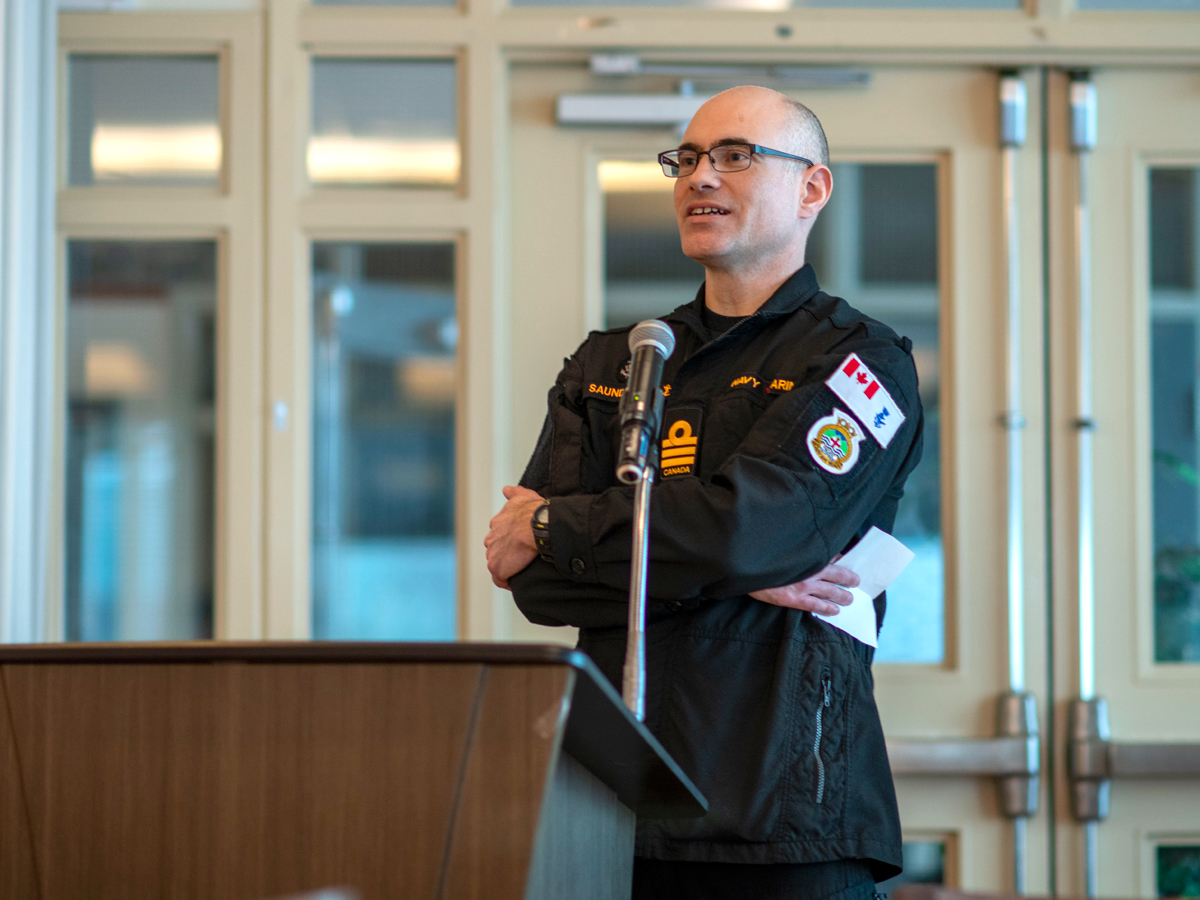
Commander Dan Saunders. Photos: Sailor 3rd Class Owen Davis, MARPAC Imaging Services, Esquimalt, BC.
Jazmin Holdway with contributions by Paul Dagonese
Lookout Newspaper
—
The Royal Canadian Logistics Service (RCLS) marked its 57th anniversary with a celebration on Feb. 3, noting decades of dedication, innovation, and unwavering support to Canadian Armed Forces (CAF) operations. The anniversary event, held at the Chief and Petty Officers’ Rainbow Room at CFB Esquimalt, brought together logisticians from across the Formation to commemorate the Service’s history and honour the individuals who play a critical role in sustaining Canada’s Defence capabilities.
As part of the celebration, Formation Logistics Awards were presented by Rear-Admiral Robinson, recognizing the exceptional contributions from junior non-commissioned members (NCMs), senior NCMs, junior officers, and Department of National Defence (DND) civilians. Guests were treated to refreshments, a cake adorned with the RCLS crest, and an opportunity to connect with fellow logisticians from all corners of the Formation.
Commander (Cdr) Dan Saunders, Formation Logistics Officer at MARPAC HQ, spoke about the significance of the anniversary.
“Logistics has been critical to the success of every CAF operation, and this celebration is about recognizing our shared history and the dedicated work of our teams,” Cdr Saunders said. “We’re spread out across many units, so it’s rare for us to come together and celebrate our achievements.”
A Rich History of Service
The roots of the Logistics Branch date back to Canada’s British military heritage, with each branch of the Armed Forces managing its logistics independently. However, in 1968, the unification of the Canadian Armed Forces led to the creation of the Logistics Branch, consolidating these various functions. In 2018, marking the 50th anniversary of its formation, the branch received its Royal designation, becoming the Royal Canadian Logistics Service.
Today, the RCLS is part of the Strategic Joint Staff, overseeing logistics across all branches of the military. As Cdr Saunders explained, the branch’s evolution from a loose organization to a highly professionalized and formalized service has been a key factor in its ability to adapt and modernize.
The logistics trade encompasses a wide range of specialties, including logistics officers, Cooks, Material Management Technicians, Human Resource Administrators, Financial Service Administrators, Mobile Support Equipment Operators, Traffic Technicians, and Ammunition Technicians. At CFB Esquimalt, over 500 uniformed logisticians from the Army, Navy, and Air Force work together, making it a truly multi-service effort.
“We also work hand-in-hand with our civilian counterparts, in warehouses, shops, offices and galleys to provide critical logistics support across the Formation,” Cdr Saunders said.
Logisticians: The Backbone of Operations
From providing critical supplies to sustaining long-term operations, the logistics service is fundamental to military success. Cdr Saunders noted that every mission, whether domestic or international, relies on the expertise of logisticians.
“You can’t have operations without logistics. Whether it’s supporting deploying ships or supporting wildfire teams, logistics personnel are there, ensuring that everything runs smoothly.”
A recent example highlighted by Cdr Saunders involved the repair and resupply efforts for HMCS Max Bernays during RIMPAC. When the ship encountered mechanical issues, the ship’s logistics section, assisted by a Forward Logistics Site team at Pearl Harbor, worked tirelessly to get the necessary materials to the vessel, ensuring it could return to sea quickly.
“A ship would remain operational for only a few days without any type of logistics support,” said Cdr Saunders. “Whether it’s the food on board, making arrangements for fuel, ammunition, or getting the material to ensure that all the critical systems are maintained or repaired, logistics is important, specifically with maritime operations,” said Cdr Saunders.
Personal Reflections and Career Insights
Cdr Saunders shared his views of the service.
“I love the variety in logistics,” he said. “From financial services to material management, there’s always something new. Whether you’re managing food services or human resources, it’s all about enabling the Canadian Armed Forces to function effectively.”
Reflecting on his career, Saunders recalled a poignant moment during Op Reassurance, where he witnessed the critical role logisticians played in supporting NATO allies and reassuring Romania during heightened tensions with Russia.
“We were really fulfilling the key aspects of Op Reassurance and our presence in Romania meant a lot to the people and dignitaries we met ashore and who were guests onboard while alongside. It was being able to see what our naval actions can do and how we can get ships to those distant locations through our sustainment efforts. It’s our logisticians who do that.”
Looking to the Future
As the Logistics Service continues to evolve, Cdr Saunders emphasized the ongoing efforts to professionalize the service, with a focus on training, recruitment, and the integration of new digital technologies. Despite challenges such as critical personnel shortages and the logistical complexities of being located on Vancouver Island, the service remains committed to providing effective support for all military operations.
For those considering a career in logistics, Cdr Saunders offered this advice: “Reach out to people that are currently serving. There are so many different opportunities and different occupations within logistics and with that variety, I’m confident people would find something that interests them.”
The 57th anniversary of the Royal Canadian Logistics Service is not just a celebration of the past but also a reminder of the vital role logisticians will continue to play in the success of military operations for the future.
“Logisticians work extremely hard each day to enable Commander RCN’s priorities of
people, platforms, and ready to fight.”
Filed Under: News Release • Top Stories
About the Author:

